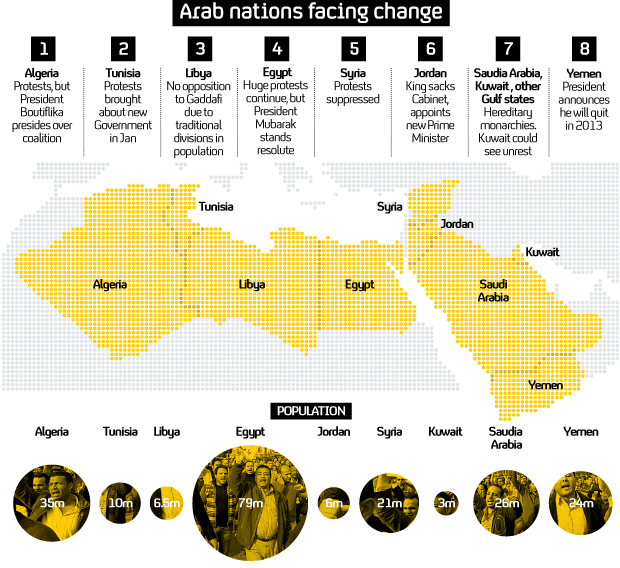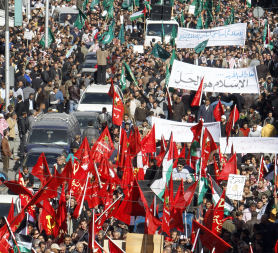Will protests have domino effect in Arab world?
Will the unrest that has unseated governments in Tunisia and Jordan infect other Arab nations? An expert tells Channel 4 News the protests will spread, but whether they succeed is another matter.

So far, protests in Tunisia have forced President Ben Ali to stand down and flee the country; the King of Jordan has dismissed his Government and appointed a new Prime Minister in the face of demonstrations; and President Mubarak’s regime in Egypt teeters on the brink as a million people march.
A fortnight ago, Channel 4 News looked at whether the so-called domino effect would see the protests spread across the Middle East and the Arab world. Since then, it has become clear that protests have taken place in a host of countries – but Middle East expert Dr Frederic Volpi, senior lecturer at the University of St Andrews, told Channel 4 News today that the key question was whether the protests will have any national impetus, and any chance of success.
“Most of the countries in the region face the same predicament – an autocratic regime which is blamed for the country’s socio-economic problems,” he said.

“So the protests could happen across the board. The question is whether there will be success across the board – or if the regime is strong or repressive enough to curtail the popular aspiration for more democracy.”
Dr Volpi analysed the different countries in the region and the potential for change for Channel 4 News.
The protests could happen across the board. The question is whether there will be success across the board. Dr Frederic Volpi
“In Syria, there are the same difficulties, but the regime so far has managed to control and suppress them. In Yemen there have been demos and protests but as yet they have not snowballed. You have to bear in mind the traditional divides across tribal lines – any national movement of people would have to overlook their tribal affiliations,” he explained.
“There is a similar situation found in Libya. The country is divided across ideological and tribal lines. Any opposition to Gaddafi would have to overcome these differences.
“In Algeria, there is a relatively similar situation, but the political system is slightly more open so it is more difficult to have popular attention focus on a single autocratic ruler. President Boutiflika is the figurehead of the regime, but really he presides over a coalition. So he could leave without reform happening. It will be difficult to find the momentum without having specific people to replace. The problem here is that it is difficult to find someone to blame,” he said.
He added: “Then in Saudi Arabia the situation is very very different. The population is fairly small and to have large scale popular unrest is far more difficult to organise in view of the social organisation of this country.
“But it is possible that in some of the more populous and urbanised Gulf states – like Kuwait for example – there could be more political mobilisation across ideological and tribal lines, trying to change the constitutional arrangements of their country to have a more democratic political system.”